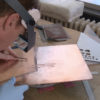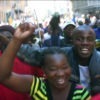
Filmmaking | Interviews | Massachusetts
Originating Great Works
Written by Kate Fitzgerald | Posted by: erin
Boston Filmmaker Cheryl Eagan-Donovan is taking on the Shakespeare authorship question with her work-in-progress documentary, Nothing is Truer than Truth, which posits Edward de Vere, the 17th Earl of Oxford, as the true Bard. Eagan-Donovan is basing her documentary on scholar Mark Anderson’s book, Shakespeare by Another Name, which has quickly become the definitive biography of de Vere.
The Shakespeare authorship question is not new, having been first raised in the early 1700s. Doubts about works attributed to William Shakespeare of Stratford-Upon-Avon have persisted because there is no physical evidence linking him to the plays and sonnets that bear his name. The man we know as William Shakespeare was also a grain merchant and sometime actor. At his death, he left nothing but a dictated will. There were no manuscripts, or letters, or diaries. “There is no proof he could even read and write,” said Eagan-Donovan.
Through the centuries, many names have been put forward such as Sir Francis Bacon and Christopher Marlowe. But John Thomas Looney was the first to proffer Edward de Vere as the true author with the publication of his book, Shakespeare Identified, back in 1920. Looney settled on de Vere as the real Shakespeare after careful examination of the Earl’s life compared to the content of Shakespeare’s plays. The Earl’s life at Court and travels throughout Europe, his stay in Venice, his facility with languages, and his Catholicism, all drew parallels Looney believed were proof that de Vere was the true author. Looney’s work was so compelling and comprehensive that Eagan-Donovan became a believer. “As a poet,” she said, “I was convinced that the early poetry published by de Vere revealed the emerging voice of the great writer we know as Shakespeare.”
Eagan-Donovan’s film will focus on the period of de Vere’s life when he traveled to Venice. “It was the New York City of its day,” Eagan-Donovan said. “This is the place were de Vere was exposed to the great masters, and to the movers and shakers of his day.” Her initial interest in the Bard was born out of frustration when as a high school student she could not afford to make the class trip to Stratford-Upon-Avon. “I vowed then to visit the birthplace of William Shakespeare on my own one day.”
At Goddard College in Vermont, Eagan-Donovan majored in writing and literature and wrote extensively on Shakespeare, but it wasn’t until 1997, while taking a history class at Harvard Extension that she learned about the authorship question. Professor Donald Ostrowski, while teaching the class about verifying source material, happened to mention the Shakespeare authorship question as an example. “This led me to read Looney’s book,” Eagan-Donovan said. She soon discovered that she’d opened the door to an entirely different universe of thought populated by experts from science, the theater, academia and even music. Each of these disciplines, she discovered, contributed to a hierarchy within the Oxfordian world that had its own protocol and power struggles. “It was fascinating just to discover it existed.”
Searching for more on de Vere, Eagan-Donovan quickly discovered that scholar Mark Anderson at the University of Massachusetts at Amherst was writing a biography of Edward de Vere. Eagan-Donovan got a copy and decided Anderson’s book was the best by far. In August 2005, Eagan-Donovan was the first in line at the Brookline Booksmith, where Anderson was making an appearance. When she presented her copy for his signature, she introduced herself and said, “I’d like to option your book for a documentary.”
That’s not something authors typically hear at book signings. What did Anderson think? “I was very eager to hear her pitch,” he said. “I have long thought that there are going to be many good movies made about de Vere and I hope Cheryl’s is one of them. She’s got good material and she’s optioned the right book.”
But while the authorship question is fascinating, the real question is, does it have any effect on the works themselves? The answer, according to Anderson, is a resounding yes. “In the context of the political issues of the time, the plays are much more powerful when you understand that the Shakespeare canon is the greatest kiss and tell ever written,” he said. Which explains why de Vere would need a stand-in to insure the plays were taken as works of fiction. “Some of the things de Vere was writing about were treasonous,” said Anderson. “It would at the very least get his hand cut off. At worst, he could be hanged.”
For Eagan-Donovan, the arc of de Vere’s life story is easily traced through the plays. “It’s all there,” she said. “The boy orphaned at 12, the cheating wife, his affair with Queen Elizabeth, his travels to Venice, everything he did is reflected in the work.” By contrast, nothing of the “Stratford man’s” life, as Eagan-Donovan calls William Shakespeare, suggests any possible source or basis for the plays. And for Eagan-Donovan, the writing is the thing. “It’s the writing and how life experience and imitation of the masters and relentless revision creates genius,” she said.
She also believes in a theory put forth by Harvard neuroscientist Steven Pinker that genius has a period of incubation at the end of which the works of that genius manifest. Eagan-Donovan sees de Vere’s sojourns through Venice and Europe as his incubation period where he absorbed the zeitgeist and learned the languages and had the life experiences that form the storylines in Othello and Hamlet and the other works. She gives as an example of de Vere’s wife becoming pregnant. That might not seem unusual in a marriage, but de Vere apparently did not have an ordinary marriage.
“He was forced to marry his wife because of the politics at Court,” Eagan-Donovan explained. “He did not consummate the marriage.” But soon after his return from Venice, de Vere did sleep with his wife. Soon after that, she announced her pregnancy. But de Vere got a tip from a servant that while he was in Venice, his wife had been sleeping with another man. It seems de Vere fell victim to a ruse. “The bed trick, as it was called,” said Eagan-Donovan. “It turns up in several of the plays.”
Eagan-Donovan admits The Oxfordian argument is not without its flaws. Edward de Vere died before several of the plays were written. But even if de Vere is not the true author, Eagan-Donovan believes his life story is still worth telling. “His life is a fascinating story all by itself,” she said, referring again to being orphaned at 12 and having an affair with the Queen. “He was brilliant, well read, he spoke several languages. He was a party boy. There are even suggestions of homosexual relationships. He did not live a quiet life.”
In May 2006, Eagan-Donovan fulfilled her long ago vow to visit England and along with her nine-year old son Liam, she finally made it to Stratford. She took in a performance of Coriolanus at the Globe Theater and traveled by train to Castle Hedingham, the ancestral home of the de Vere family since the 12th century. But Eagan-Donovan wasn’t just there for a pleasure trip. She went there to film comments by leading Oxfordian scholars. From this work, she produced a trailer, which she has been using to help her raise funds to allow her to film in Venice and complete her documentary.
What were her impressions of Stratford-Upon-Avon when she finally arrived? “The Stratford people think of it as a holy place,” she said. “It’s amazing how much reverence they invest in that place. But when the paradigm shifts, because it will eventually, Stratford-upon-Avon won’t go away. There will be buses back and forth between Stratford and Castle Hedingham because the Stratford man will always be part of the scene. The Stratford supporters won’t give that up. He’ll be the connection, the one who actually got the plays onto the stage.”
To help Eagan-Donovan raise funds to complete her film, a benefit performance of ‘Shakespeare’s Treason’ — a one-man show by Hank Whittmore — will be held at the Next Door Theater in Winchester, MA on March 28th at 7 pm.
For more information visit www.controversyfilms.com.
To help Eagan-Donovan raise funds to complete her film, a benefit performance of 'Shakespeare’s Treason' -- a one-man show by Hank Whittmore -- will be held at the Next Door Theater in Winchester, MA on March 28th at 7 pm. For more information visit www.controversyfilms.com.












